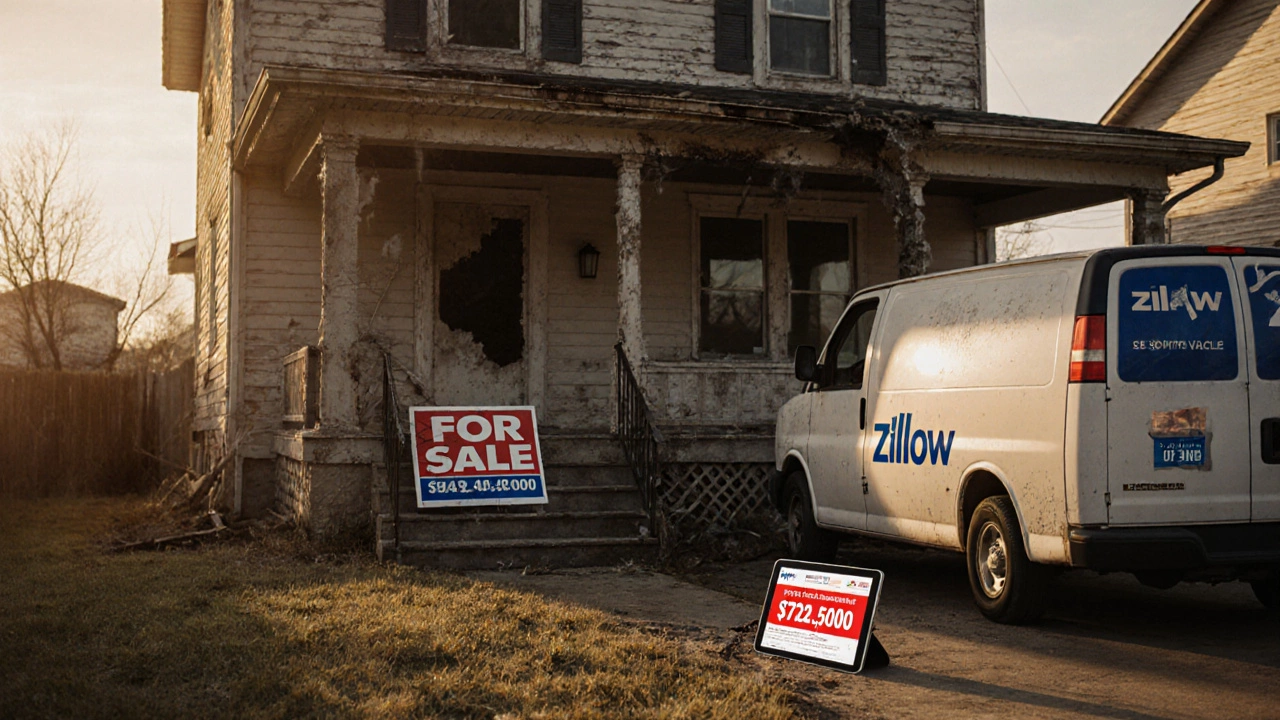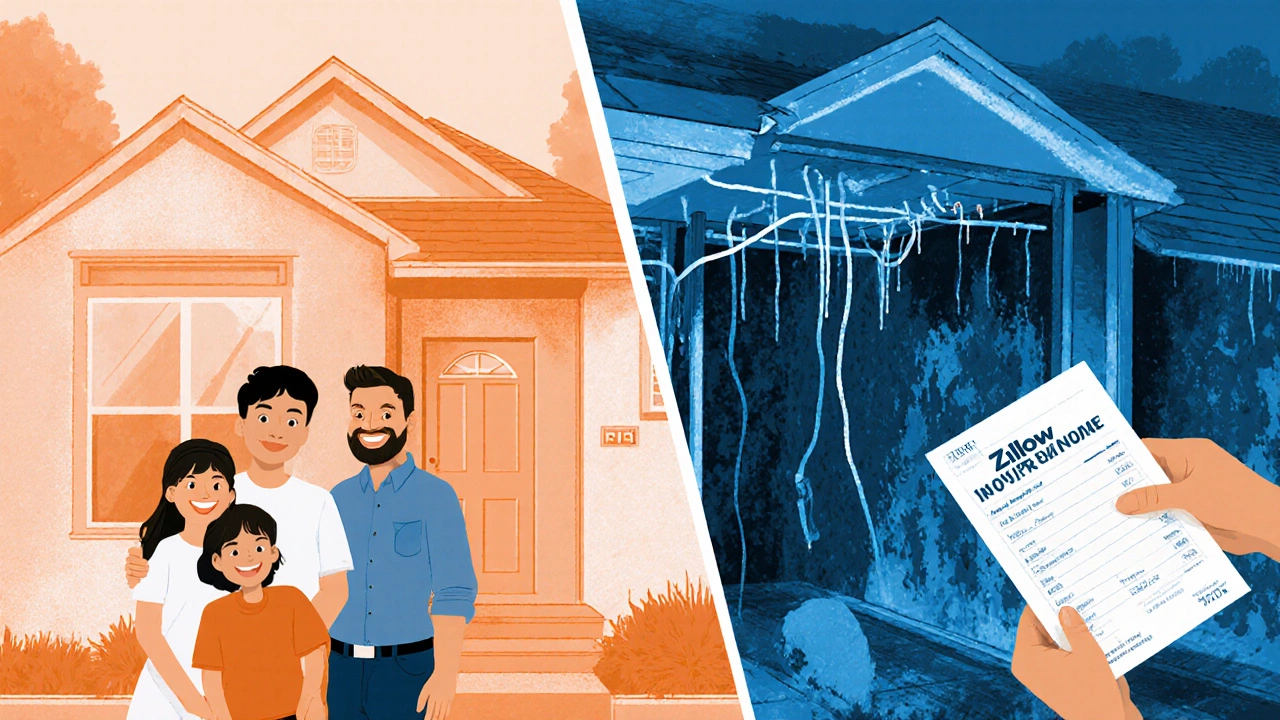What Is Zillow Being Sued For? The Truth Behind the Lawsuits and How It Affects Home Buyers

Nov, 16 2025
Zestimate Accuracy Calculator
Zestimate Accuracy Calculator
Zillow's Zestimate has an average error rate of 7.9% nationwide, but in fast-moving markets, it can exceed 15%. Enter your home's details to see how Zillow's estimate might compare to actual market value.
When Zillow bought homes outright and flipped them within weeks, it looked like the future of real estate. But by late 2021, the company had lost over $1 billion on its iBuying program. Today, Zillow is facing multiple lawsuits that aren’t just about bad business decisions-they’re about broken promises, misleading data, and how tech companies treat everyday home buyers.
Why Zillow Got Sued: The iBuying Collapse
Zillow’s big bet was Zillow Offers, its iBuying platform. The idea was simple: use algorithms to make instant cash offers on homes, buy them outright, renovate them, and sell them fast. It sounded like a win-win. Sellers got speed. Buyers got move-in-ready homes. But the math didn’t add up.
By 2021, Zillow was overpaying for homes because its algorithm kept misreading local market conditions. In cities like Phoenix and Austin, where prices spiked fast, Zillow’s system couldn’t adjust in time. It bought homes at $400,000 and sold them for $370,000. In some cases, it lost over $100,000 per house. That’s not a glitch-it’s a systemic failure.
When Zillow shut down Zillow Offers in November 2021, it didn’t just walk away. It left behind hundreds of sellers who were stuck in limbo. Some had already moved out of their homes, waiting for closing. Others had signed contracts based on Zillow’s final offer, only to be told weeks later that the deal was off.
The Class-Action Lawsuit: Fraud and Misrepresentation
In March 2023, a class-action lawsuit was filed in the U.S. District Court for the Northern District of California. It accused Zillow of fraudulently inflating home values to lure sellers into its program.
The lawsuit claims Zillow used its Zestimate tool-the public-facing home value estimator-to make sellers believe their homes were worth more than they actually were. Sellers accepted offers based on these inflated numbers. Then, when Zillow backed out, they were left with no home, no sale, and no recourse.
One plaintiff from Denver, a retired teacher, told the court she spent three months preparing her house for sale after accepting Zillow’s $725,000 offer. She paid for repairs, hired movers, and even rented a storage unit. Then Zillow canceled the deal, saying the Zestimate was “inaccurate.” She lost over $12,000 in costs and never got her house back on the market until six months later.
The lawsuit argues Zillow knew its algorithm was flawed but kept using it anyway because it drove traffic and seller sign-ups. That’s not a mistake. That’s intentional deception.
Another Lawsuit: False Advertising to Buyers
While sellers were getting burned, buyers were being misled too. In June 2024, a separate lawsuit was filed by a group of homebuyers in Texas and Florida. They claimed Zillow advertised homes as “move-in ready” when they were not.
Buyers paid premium prices for Zillow-owned homes, expecting renovations to be complete. But many homes had unfinished kitchens, broken HVAC systems, and unpermitted electrical work. One buyer in Orlando found mold behind new paint. Another in Miami discovered the roof was leaking-despite Zillow’s listing claiming “new roof.”
The lawsuit says Zillow’s listings violated the Federal Trade Commission’s guidelines on truthful advertising. By omitting known defects and using vague terms like “updated” or “refreshed,” Zillow created a false sense of security.
Even worse, Zillow’s customer service team allegedly told buyers to “just fix it yourself” when problems were reported. No refunds. No repairs. No accountability.

How Zillow’s Practices Hurt the Housing Market
This isn’t just about Zillow’s mistakes. It’s about how those mistakes changed how people buy and sell homes.
Before Zillow Offers, sellers had two options: list with an agent or sell privately. Zillow made it seem like there was a third, faster, safer option. But when the program collapsed, it eroded trust in online platforms. Now, sellers are wary of any service that promises “instant cash.” Buyers are skeptical of “renovated” homes listed on Zillow.
Real estate agents have seen a drop in referrals from Zillow. Some say the platform now feels more like a lead generator than a trustworthy marketplace. And in cities where Zillow was a major buyer-like Atlanta, Nashville, and Charlotte-home prices still haven’t fully recovered from the artificial demand spike.
Even Zillow’s own employees have spoken out. In 2022, a former data scientist leaked internal emails showing executives knew the Zestimate error rate was above 15% in high-growth markets-far above the 5% they publicly claimed. The company never disclosed that.
What This Means for You as a Homebuyer
If you’re looking to buy a home through Zillow today, here’s what you need to know:
- Don’t trust Zestimate values-they’re estimates, not appraisals. Always get a professional appraisal.
- Verify renovation claims-ask for permits, inspection reports, and receipts for upgrades. If Zillow says “new kitchen,” demand proof.
- Watch for red flags-if a home is priced significantly below comparable listings, it might have hidden issues.
- Use a buyer’s agent-they can help you navigate Zillow listings and push for disclosures you won’t get otherwise.
Zillow still lists millions of homes. But the company’s reputation is damaged. And until it fixes its transparency issues, buyers and sellers should treat its platform with caution.

What Zillow Is Doing Now
Zillow hasn’t admitted fault. But it has quietly changed its practices.
It no longer buys homes directly. Its iBuying program is dead. The company now focuses on listing homes from traditional agents and offering tools like Zillow Offers for sellers who want to list with an agent-but still get a fast sale.
It also updated its Zestimate algorithm in early 2024 to include more local data points, like recent sales of similar homes within a 1-mile radius. But the public still can’t see how the algorithm works. No transparency. No audit trail.
The lawsuits are still ongoing. The class-action case is in discovery. The buyer fraud case is awaiting a judge’s ruling on whether Zillow’s marketing materials constitute legal deception.
For now, Zillow remains the most visited real estate site in the U.S. But its credibility is hanging by a thread.
Alternatives to Zillow
If you’re tired of Zillow’s history, here are three more reliable options:
- Realtor.com-backed by the National Association of Realtors, it pulls listings directly from MLS systems. Fewer errors, more transparency.
- Redfin-offers in-house agents and full-service buying. Less flashy, but more accountable.
- Trulia-owned by Zillow, but its data feeds are separate. Still useful, but don’t confuse it with Zillow’s own listings.
None of these platforms are perfect. But they don’t have a $1 billion loss on their record-or a courtroom full of angry homeowners.
Final Thoughts
Zillow didn’t just fail as a business. It failed as a trusted partner for everyday people trying to buy or sell their homes. The lawsuits aren’t about money. They’re about trust.
If you’re using Zillow to find a home, treat it like a search engine-not a guide. Double-check everything. Ask for documentation. Don’t assume the numbers are right. And if something seems too good to be true? It probably is.
The real estate market is already hard enough. You don’t need a tech giant’s broken algorithm making it worse.
Is Zillow still buying homes?
No. Zillow shut down its iBuying program, Zillow Offers, in November 2021. It no longer purchases homes directly. Today, it acts as a listing platform for traditional real estate agents.
Are Zillow’s home value estimates reliable?
No, not consistently. Zillow’s Zestimate has an average error rate of 7.9% nationwide, but in fast-moving markets, it’s often over 15%. It’s a starting point, not a final value. Always get a professional appraisal before making an offer.
Can I sue Zillow if my home sale fell through?
Possibly. If you accepted an offer from Zillow Offers and the deal was canceled without cause, you may be eligible to join the ongoing class-action lawsuit. You’ll need documentation showing financial loss-like moving costs, repair expenses, or lost rent. Consult a real estate attorney to explore your options.
Why do Zillow listings sometimes show homes as renovated when they’re not?
Zillow relies on sellers and agents to provide renovation details. There’s no mandatory inspection or verification process. Terms like “updated,” “refreshed,” or “modernized” are subjective. Always ask for receipts, permits, or inspection reports before assuming a home is truly renovated.
Should I still use Zillow to search for homes?
Yes-but with caution. Zillow has the largest database of listings. But treat it like a catalog, not a guarantee. Verify every claim, get an independent inspection, and work with a licensed buyer’s agent. Don’t let convenience override due diligence.